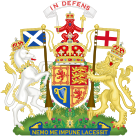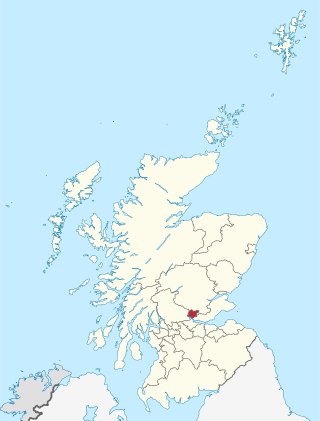
Clackmannanshire, or the County of Clackmannan, is a historic county, council area, registration county and lieutenancy area in Scotland, bordering the council areas of Stirling, Fife, and Perth and Kinross. In terms of historic counties it borders Perthshire, Stirlingshire and Fife.

The Scottish Parliament is the devolved, unicameral legislature of Scotland. Located in the Holyrood area of the capital city, Edinburgh, it is frequently referred to by the metonym Holyrood. The Parliament is a democratically elected body comprising 129 members known as Members of the Scottish Parliament (MSPs), elected for five-year terms under the regionalized form of additional member system (MMP): 73 MSPs represent individual geographical constituencies elected by the plurality (first-past-the-post) system, while a further 56 are returned as list members from eight additional member regions. Each region elects seven party-list MSPs. Each region elects 15 to 17 MSPs in total. The most recent general election to the Parliament was held on 6 May 2021, with the Scottish National Party winning a plurality.

Fife is a council area, historic county, registration county and lieutenancy area of Scotland. It is situated between the Firth of Tay and the Firth of Forth, with inland boundaries with Perth and Kinross and Clackmannanshire. By custom it is widely held to have been one of the major Pictish kingdoms, known as Fib, and is still commonly known as the Kingdom of Fife within Scotland. A person from Fife is known as a Fifer. In older documents the county was very occasionally known by the anglicisation Fifeshire.

The Forth Road Bridge is a suspension bridge in east central Scotland. The bridge opened in 1964 and at the time was the longest suspension bridge in the world outside the United States. The bridge spans the Firth of Forth, connecting Edinburgh, at South Queensferry, to Fife, at North Queensferry. It replaced a centuries-old ferry service to carry vehicular traffic, cyclists and pedestrians across the Forth; railway crossings are made by the nearby Forth Bridge, opened in 1890.
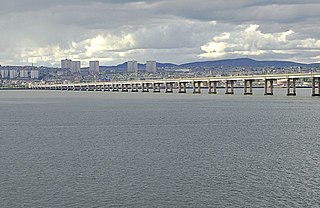
The Tay Road Bridge carries the A92 road across the Firth of Tay from Newport-on-Tay in Fife to Dundee in Scotland, just downstream of the Tay Rail Bridge. At around 2,250 metres (1.4 mi), it is one of the longest road bridges in Europe, and was opened in 1966, replacing the old Tay ferry.

Capital punishment in the United Kingdom predates the formation of the UK, having been used within the British Isles from ancient times until the second half of the 20th century. The last executions in the United Kingdom were by hanging, and took place in 1964; capital punishment for murder was suspended in 1965 and finally abolished in 1969. Although unused, the death penalty remained a legally defined punishment for certain offences such as treason until it was completely abolished in 1998; the last execution for treason took place in 1946. In 2004 the 13th Protocol to the European Convention on Human Rights became binding on the United Kingdom; it prohibits the restoration of the death penalty as long as the UK is a party to the convention.

James Alexander Stewart Stevenson is a Scottish former politician who served as Minister for Transport, Infrastructure and Climate Change from 2007 to 2010 and Minister for Environment and Climate Change from 2011 to 2012. A member of the Scottish National Party (SNP), he was Member of the Scottish Parliament (MSP) for Banffshire and Buchan Coast, formerly Banff and Buchan, from 2001 to 2021.
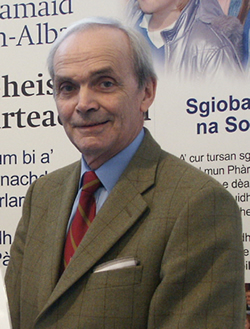
John Farquhar Munro was a Scottish Liberal Democrat politician. He was the Member of the Scottish Parliament (MSP) for Ross, Skye and Inverness West from 1999 until his retirement in 2011.
Scott Barrie is a Scottish Labour Party politician and former social worker. He was the Member of the Scottish Parliament (MSP) for Dunfermline West from 1999 to 2007, where he was a member of the Communities Committees of the Parliament.

The Erskine Bridge is a multi span cable-stayed box girder bridge spanning the River Clyde in west central Scotland. The bridge connects West Dunbartonshire with Renfrewshire and can be used by all types of motor vehicles, cyclists and pedestrians. As well as crossing the Clyde, the bridge also crosses the Forth and Clyde Canal and the North Clyde railway line. A small part of Kilpatrick railway station is situated underneath the bridge at the north side. The bridge is part of the A898 road. On completion the bridge replaced the Erskine to Old Kilpatrick ferry service.
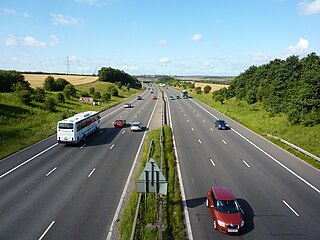
The United Kingdom has a well developed and extensive network of roads totalling about 262,300 miles (422,100 km). Road distances are shown in miles or yards and UK speed limits are indicated in miles per hour (mph) or by the use of the national speed limit (NSL) symbol. Some vehicle categories have various lower maximum limits enforced by speed limiters. A unified numbering system is in place for Great Britain, whilst in Northern Ireland, there is no available explanation for the allocation of road numbers.

Michael Joseph McMahon is a former Scottish Labour Party politician. He was a Member of the Scottish Parliament (MSP) from 1999 until 2016. He was MSP for the Hamilton North and Bellshill constituency from 1999 until its abolition in 2011, and then for the Uddingston and Bellshill constituency from 2011 to 2016.

The Abolition of Poindings and Warrant Sales Act 2001 was an Act of the Scottish Parliament to abolish the previous practice in which a debtor's goods are priced (poinding) in preparation for the enforced sale of the debtor's possessions. The legislation was introduced in 1999 as a member's bill by Tommy Sheridan MSP, the sole member of the Scottish Socialist Party in the Parliament.
Toll roads in Great Britain, used to raise fees for the management of roads in the United Kingdom, were common in the era of the turnpike trusts. Currently there is a single major road, the M6 Toll and a small number of bridges and tunnels where tolls are collected. In addition, there are also two UK road pricing schemes, the London congestion charge and the Durham congestion charge.

The Protection of Wild Mammals (Scotland) Act was an Act of the Scottish Parliament passed in February 2002, making Scotland the first part of the United Kingdom to ban traditional fox hunting and hare coursing. It was repealed in 2023.

The Abolition of Feudal Tenure etc. (Scotland) Act 2000 was a land reform enforced by an Act of the Scottish Parliament that was passed by the Scottish Parliament on 3 May 2000, and received Royal Assent on 9 June 2000.

A warrant sale was a statutory means of collecting debts in Scotland until 2001. Legal procedure for warrant sales was governed by the Debtors (Scotland) Act 1987. The practice was controversial, those who opposed it were concerned that it affected the poorest section of society who genuinely were unable to pay a debt, others claimed the legislation was needed to ensure people paid their debts.

The Erskine Bridge Tolls Act 2001 is an Act of the Scottish Parliament which restored, with retrospective effect, the power to levy tolls. This power was originally conferred by section 1(1) of the UK Parliament Erskine Bridge Tolls Act 1968.

The Offensive Behaviour at Football and Threatening Communications (Scotland) Act 2012 was an Act of the Scottish Parliament which created new criminal offences concerning sectarian behaviour at football games. The Act was repealed on 20 April 2018.
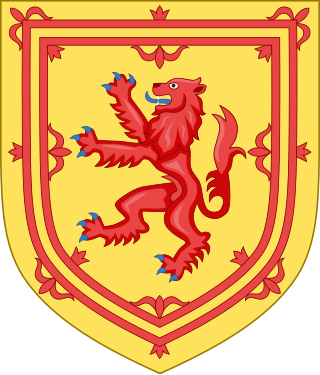
An act of the Scottish Parliament is primary legislation made by the Scottish Parliament. The power to create acts was conferred to the Parliament by section 28 of the Scotland Act 1998 following the successful 1997 referendum on devolution.
